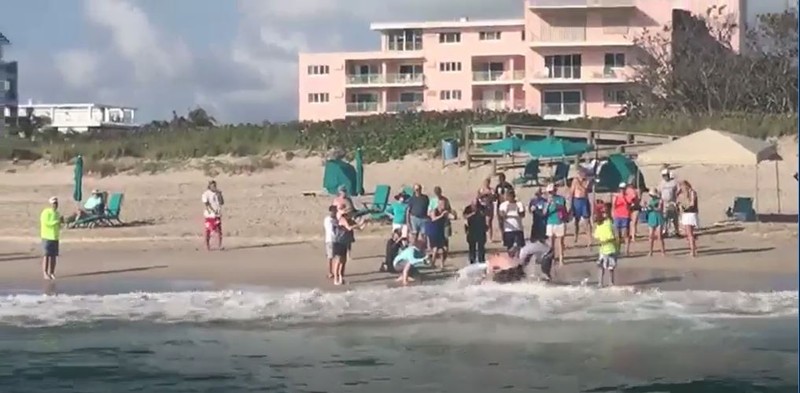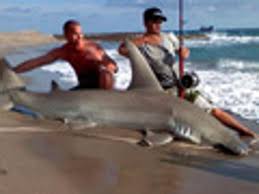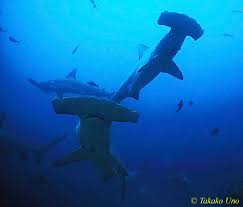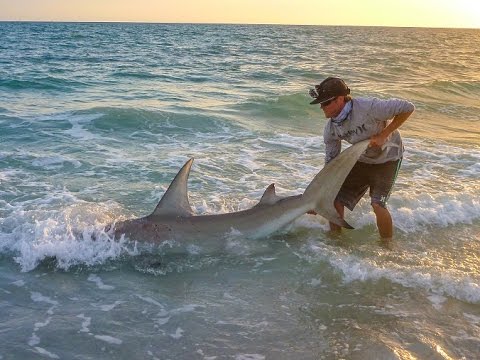Disturbing video showed an endangered hammerhead shark hooked and dragged to the shore in Lake Riviera Beach along Singer Island, Florida on Thursday morning. According to an eyewitness, Leigh Cobb, a diver who tracks and tags sharks, had been in a boat off shore and was shocked while capturing the situation on video.

In a WptvNews report, Leigh had seen a crowd gathered on the beach. Moments later she spotted the Hammerhead hooked and being dragged to the shore by three fishermen. Before the men attempted to remove the hook from the shark’s mouth, people gathered around for photo opportunities and of course “selfies.”
“You know on a public beach, 9:30 in the morning we are seeing a shark blood baited to come close to the water and then drag it onto the beach,” Leigh stated. “It was just I couldn’t believe what I was seeing. This shark was about five meters long. That’s scary for some people.”
Other witnesses recounted a half-hour struggle before landing the shark, but once the fishermen hooked it and brought it to shore, they tagged the shark as per NOAA to collect data and cut the hook off with a bolt cutter stating it was the “fastest way to get the animal safely returned to the water.”

In Florida it is illegal to land great Hammerhead sharks if the shark isn’t returned immediately to the water, according to the Florida Fish and Wildlife Commission’s website – with federal penalties possible as it’s an endangered species.
Although shark fishing is legal in Florida, Fish and Wildlife has Hammerheads listed under sharks you can not fish for. The following rules apply:
- Minimize fight time. Use Shark-Smart tackle.
- Do not specifically target sharks if the surf is too rough to release appropriately and safely.
- Keep sharks, especially the gills, in the water.
- Removing sharks from the water increases the likelihood of injuries to the angler or the shark.
- NEVER bring a large shark onto a fishing vessel, a pier or bridge or onto dry land beyond the surf zone unless you plan to harvest it.
- Minimize handling and release time and do not delay release just to take pictures.
- Do not sit on the shark’s back or pull back on the snout to reveal the teeth.
- Use a long-handled dehooking device to help with hook removal.
- If you cannot safely and quickly remove the hook from the mouth, a bolt cutter may be used to cut the hook. If this method delays release or it becomes unsafe to do so, leave the hook in the shark and cut the leader as close to the hook as you can. Wire leaders can be cut with wire cutters.
- Sharks that swim off with a long length of line trailing behind them may be less likely to survive.
Scalloped hammerhead sharks were the first species of shark to be protected by the United States Endangered Species Act in July 2014. Scientific American notes the Hammerhead sharks are the most highly threatened migratory sharks.

“They travel in schools across jurisdictional boundaries, are prized for their fins, are often targeted as juveniles for their meat, and are especially unlikely to survive the stress of capture, even when carefully released.” A report [pdf] showing that the closely related great hammerhead shark has an extremely pronounced stress response to being caught by fishing gear was published earlier this year. “Due to physiological constraints, hammerheads in general are a relatively fragile shark,” says Robert Hueter, director of the Center for Shark Research at Mote Marine Laboratory in Sarasota, Fla. “So it’s not surprising that the scalloped hammerhead has become endangered or threatened throughout most of its range. The question is, are the other species of hammerheads not far behind?”
Even though the shark has been released, it is not known if it will survive. Nearly half of the sharks caught and then released do not survive after four weeks.
If you suspect someone is abusing wildlife, alert the Florida Fish and Wildlife Conservation Commission by calling the Wildlife Alert Hotline at (888) 404-3922 or texting [email protected].
Check out the video:

Did you know that if you want to get updates from a Facebook page, you need to do more than “like” it? To get recent postings in your Facebook feed, you must also hover your mouse over the word “following” and then click “see first” from the drop-down menu. You may want to check back with your favorite pages on occasion because Facebook often changes your settings, no longer having your having your favorites among those to “see first.
Follow the National Pet Rescue on Facebook.
- Woman discovers dirty truth about hand dryers – and it’s gross!
- Boy gets stuck in claw machine while trying to get a stuffed animal
Our site is supported by revenue from links created by the Little Things:
Mail inspectors shocked to find live animal in box – ready to be shipped

Train strikes dog and the dog survives!





Damn you Psycho As*hole Monsters !!!
Just ban any form of hunting or capture of these animals. People do not read everything and tend to gloss over the important stuff. No one needs these”trophy fish” anyway.
Ignorant bastards! F*CK your “selfies”!
What the FUCK!!!!! Everyone of them need to be charged with this ABUSE!!!!! I hope they all go straight to PRISON!!
Yes report it, but what about an investigation now with this incident. It’s on video. Why are there people like this?
I’d rather see a selfie of a shark pulling those idiots into the water and getting his just revenge.